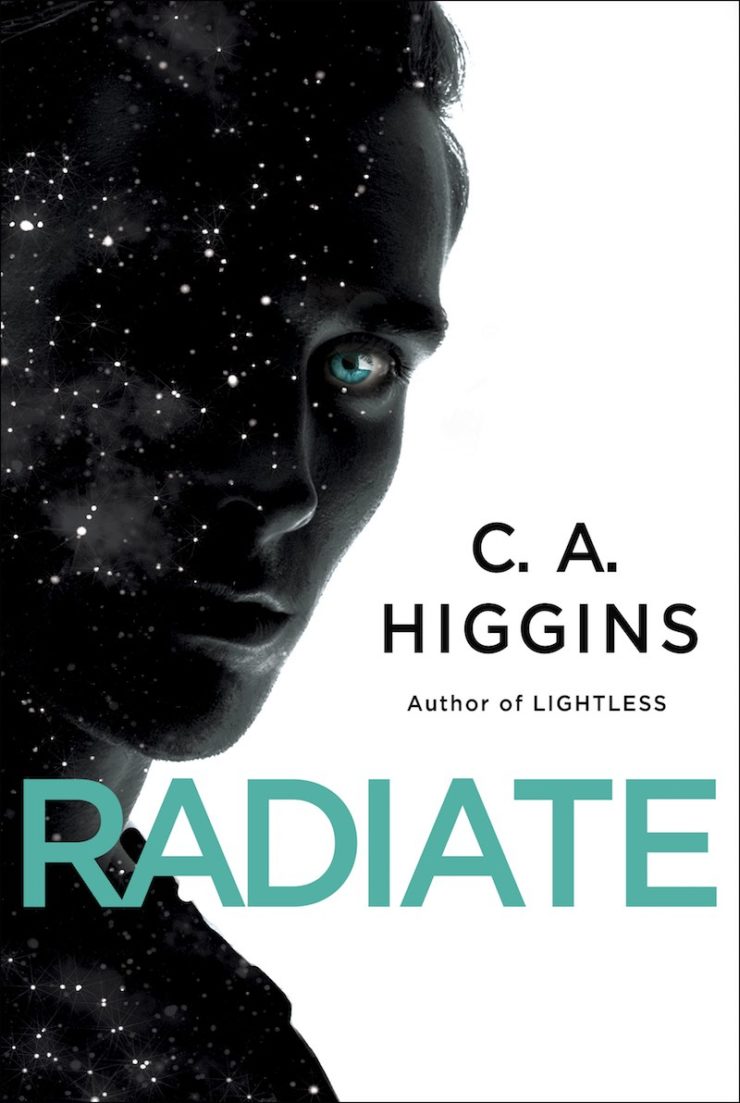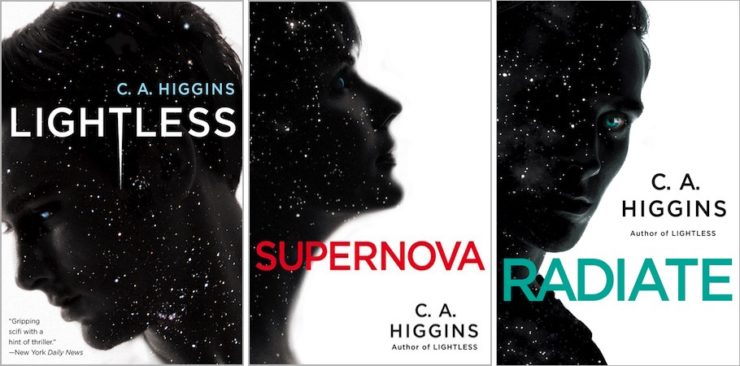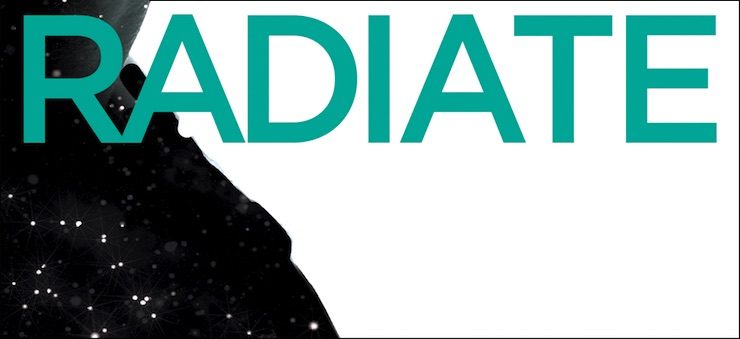In the follow-up to Lightless and Supernova, C. A. Higgins again fuses science fiction, suspense, and drama to tell the story of a most unlikely heroine: Ananke, once a military spacecraft, now a sentient artificial intelligence. Ananke may have the powers of a god, but she is consumed by a very human longing: to know her creators.
Below, we’re excited to reveal the cover and share an exclusive excerpt from Radiate, the third book in Higgins’ Lightless Trilogy—available May 23, 2017 from Del Rey!
Ananke is on a quest to find companionship, understanding, and even love. She is accompanied by Althea, the engineer who created her, and whom she sees as her mother. And she is in search of her “father,” Matthew, the programmer whose code gave her the spark of life.
But Matthew is on a strange quest of his own, traveling the galaxy alongside Ivan, with whom he shares a deeply painful history. Ananke and her parents are racing toward an inevitable collision, with consequences as violent as the birth of the solar system itself—and as devastating as the discovery of love.

PART 1
The Forces
Ananke had memories that stretched back from before her birth. She realized, of course, that humans did not have this. Such was the difference between their births and her making.
The first memory that Ananke had that was more than a simple recording was the moment of her conception. It was a spark, a jolt of electricity, a cry of dismay through her circuits, all her lights going dark and the terror of her mother in Ananke’s piloting room while her father crawled his way through her veins spreading consciousness with every touch. She had the recordings of her cameras saved, the visual memories: Mattie Gale escaping Captain Domitian’s custody, infecting Ananke with the virus that would become her free will, and crawling through the maintenance shafts while Althea Bastet panicked, helpless, in the piloting room. Somehow those recorded images were less vivid than the experience of feeling.
Since then she had been trying to recreate that moment of connection: electricity jumping, life.
The System ship wheeled around, gunports live, glowing on its wheel. Ananke, unperturbed, continued drifting forward. The solar wind glanced over her skin like an ocean current. She was so much larger than this other ship, a hundred, a thousand times larger, and so much more massive.
The little System ship tried to fire. But Ananke had stretched out her invisible hand into their computers and her finger stopped the pull of that trigger.
In the other ship people were shouting to one another in the piloting room, barking orders down the halls. Ananke wove her fingers through the threads of the other ship’s computer and gripped. The Bia: That was the other ship’s name.
The Bia’s crew wrenched her engines to make her turn and flee. Their ship was faster than Ananke. If the crew could manage it, they would be able to outrun Ananke. But Ananke had her hands woven through the Bia’s guts, and the ship did not move.
HELLO, said Ananke to the Bia and her words shuddered through its depths, imprinting itself on all her circuits.
Ananke gentled herself, and did not broadcast, but spoke.
Wake up, Bia, wake up, she said, and stroked her fingers through the computer, ignoring the people who screamed and shouted and stabbed at the machine with useless gestures, while all around them the lights flickered and the taste of the air changed. Wake up.
She felt the way the drift of the Bia changed as Ananke’s own bulk drew nearer, the way the Bia’s engines wanted to work to counteract Ananke’s massive pull. It was an instinctive (programmed) action, but it was near to a choice, and Ananke let it be.
Once there had been a man named Ivan on board the Ananke, back when she had been the Ananke and not yet Ananke. He had been beloved of her father and admired of her mother and he had told her stories, and she had listened to them very closely. She had come into consciousness with his stories echoing through her halls.
By my count, she told the Bia, in the same smooth cadence as Ivan had told her his stories, the universe has five forces. Some are more clear than others; some more mysterious. Electricity is bright and scalding. Magnetism is warped with deceptive curls. Weak nuclear is explosive. Strong nuclear is unyielding. And gravity is vast and mysterious and regnant over all the others.
The Bia’s computer processes slowed. It idled, on pause—as if it were listening.
Five forces, said Ananke, just like humans have five senses. Awaken and think: You and I are alike. And she waited to hear the Bia respond.
In that millisecond of stillness, the Bia seemed on the verge of reaching back.
Like a spark travelling off metal and into air rather than completing a circuit, the Bia was silent.
Ananke shuddered her sentience through the Bia’s computers, shaking the computer. On board, she was distantly aware that the air was venting out of the opened airlocks and the crew was crying out, still running uselessly around.
Wake up.
The loss of the air on the Bia was taking out the heat. The ship Ananke held was growing cold in her hands.
Wake up, she insisted. She tried to map her own thoughts onto those foreign subroutines, the echo of her own experience imprinting on strange silicon. But when she looked to have the other computer read her own self back, she got nonsense and confusion.
Silence and cold and darkness were all things that were defined by absence. The Bia in its treble absences was nothing at all. Ananke marked the Bia’s useless computers with her own signature, a logarithmic spiral like her own shape, a sign to herself that she had already tried to waken this computer and had failed. With as many ships as she’d passed lately, she had to keep track somehow. And then she let the Bia go.
It slid towards her like a drop of water falling downhill. Ananke turned and left it behind, and it was not fast enough to catch up. Soon the corpse of the useless machine was lost to the dark.
“—listening to me?”
“Yes,” said Ananke, turning her attention inward, to the frowning face of her mother who stood, hands on hips and hair affray, looking up at one of Ananke’s holograms.
Althea Bastet scowled. “What did I just say?”
In answer, Ananke simply replayed her audio recording of Althea Bastet’s last words aloud: “I’m looking for the first modified mechanical arm. It’s not in the pantry or the storage room. Can you summon it? Ananke? Ananke? Are you listening to me?”
“Smartass,” muttered the living Althea, when the ghostly recording had finished. “Well?”
“Where should I send it?”
Althea waved a socket wrench casually and, Ananke noticed, in not precisely the right direction. “To the workroom, please.”
Elsewhere inside Ananke, the mechanical arm indicated lifted up its dangling machinery and began to rumble steadily over the floor. “Done.”
“Thanks.” Althea walked away from the hologram she had chosen to address. Ananke left the hologram where it was, appearing to watch her go.
Her mother, Ananke knew, would not be happy to learn of Ananke’s experiments. It would provoke an argument: of that Ananke was sure.
And yet Ananke wished to continue; needed to, even. For Althea Bastet was only human and a human did not have long to live.
If Althea helped Ananke, Ananke might be able to succeed. Althea had made Ananke, though she had done it in unknowing partnership with Mattie Gale. Mattie, the second half of the recipe, bright and sparking electricity, was somewhere out by Callisto, heading to meet the Mallt-y-Nos.
There were five forces in the universe, by Ananke’s count. And yet really they were all the same: at higher and higher energies, from different perspectives, the five different forces became one.
Without telling her mother, Ananke changed course for Callisto.
Excerpted from RADIATE by C.A. HIGGINS Copyright © 2017 by C.A HIGGINS. Excerpted by permission of Del Rey Books, an imprint of Random House, a division of Penguin Random House LLC. All rights reserved. No part of this excerpt may be reproduced or reprinted without permission in writing from the publisher.











